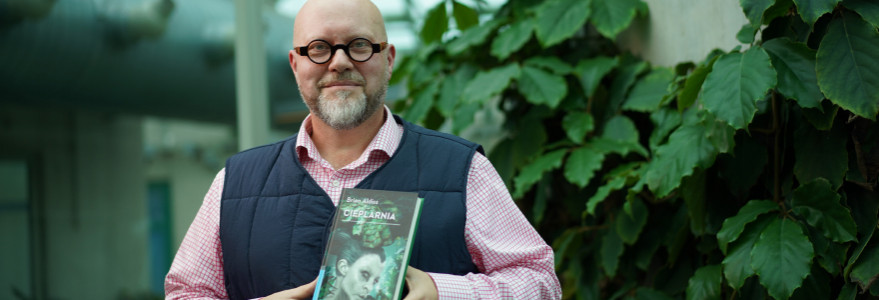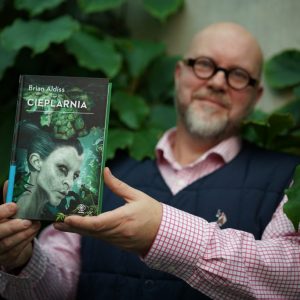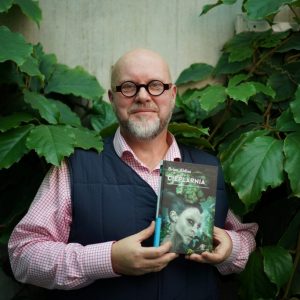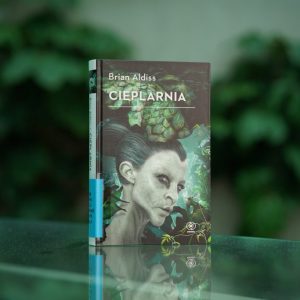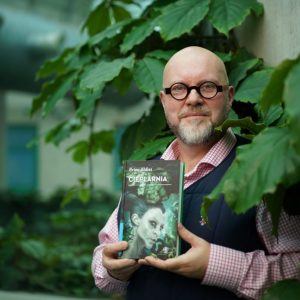“This book shows that between the domination of our species and its fall there is a very narrow biological barrier resulting from environmental conditions,” Prof. Marcin Zych says. The Director of the UW’s Botanical Garden recommends the work Hothouse by Brian W. Aldiss in the next episode of the “Read with the UW” series.
Prof. Marcin Zych graduated from the Faculty of Biology, the University of Warsaw. He was also studying at the School of Biological Sciences, the University of Wales. In 2003, he obtained a doctoral degree and in 2014, he became an assistant professor. In 2022, he received an academic title of professor.
Prof. Zych’s research interests are centred around biology of plants and evolutionary ecology, with a particular focus on the evolution of plant reproductive systems and ecological interactions of plants. He is the author of around fifty scientific articles and many conference reports. He is also involved in promoting natural science knowledge.
Prof. Marcin Zych works at the UW’s Faculty of Biology, and as of March 2019 he holds the position of the Director of the Botanical Garden. Furthermore, he is a member of the Rector’s Team for Ecology and Climate Crisis for the 2020–2024 term.
Vision of the future
“In his book the author shows the Earth, which is beginning to come to its end. The Sun is dying out and the Earth stops spinning on its axis. On the globe and, to be exact, on its brighter part, which is a continuous day, huge tragedies, but also various love stories are unfolding,” Prof. Marcin Zych is presenting the book Hothouse by Brian W. Aldiss in the second episode of the third series of the “Read with the UW”.
Hothouse is a science fiction novel, whose author depicts an original, i.e. dark, but hypnotising vision of the future. This is a story of the world dominated by plants. Although there are human figures in the novel, such as main characters: Lily-yo and Gren, they are not the most important ones. The crucial part of the story is formed by nature and its descriptions.
https://www.youtube.com/watch?v=Dt6aR_ME7KI
Life on a fig tree
“The world in the book is extraordinary because it is covered entirely in green,” Prof. Marcin Zych explains, “The story features not only fantastic plants and animals, but also a fungus, which is an interesting reference to the recent cultural codes, in which fungi gain more influence and begin to make us worried.”
The jungle in Hothouse has become huge and dominates the whole planet. The animals, which have survived, are hiding in dense bushes and humans are a dying species. A small population lives on one big fig tree and the only chance for the survival of the humankind is a symbiotic relation with an intelligent fungus.
Five billions years later
According to Aldiss, the evolution has enabled just the strongest to survive. In this case, it is plants that supress humans in an uneven battle with the global warming, the topic considered by the author already at the time of writing.
The humanity does not remember its previous achievements and is going back in its development to the prehistoric phase, i.e. primal instincts. It means that the human’s only goal is to survive.
“The book is a portrait of the author’s great imagination, but it also gives us a chance to reflect on how little it takes for humans to go from being hegemons of the world to subordinate species that will mean very little,” Prof. Marcin Zych summarises.
The book Hothouse by Brain W. Aldiss as well as his other works can be found in the University of Warsaw Library, in open stacks, in the English and American Literature section.
Hothouse by Brain W. Aldiss was first published in 1961 in The Magazine of Fantasy & Science Fiction in the form of five novelettes. They were awarded Hugo Award for Best Short Fiction. In 1962 Hothouse was issued as a novel.



